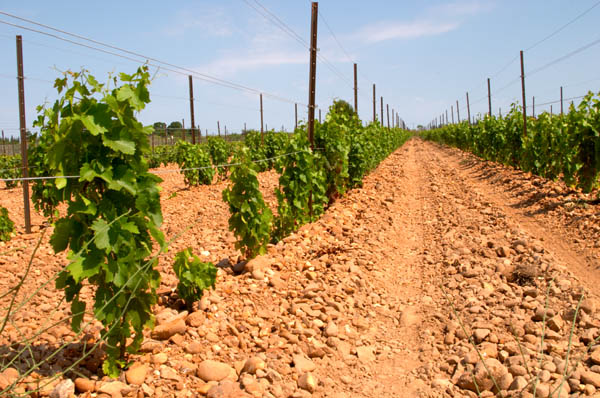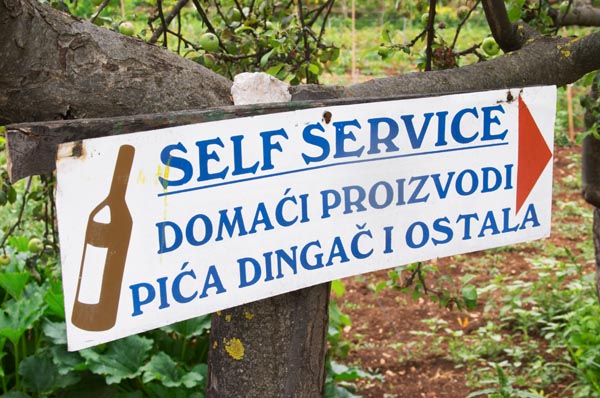“Planting rights” is an archaic system that limits the rights to plant new vines and protects the incumbent wine producers from competition. In this article Per Karlsson explains why it is bad for wine consumers and also bad for the long term health of the wine industry as a whole.
My primary interest in wine is as a wine drinker. As a wine writer my primary responsibility and loyalty is to the wine consumer. This is important. I don’t write to protect the interests of “the wine industry” or to promote any specific wine sector. I write because I love good wine and want to bring it within the reach of as many wine lovers and consumers as possible.
When it comes to this touchy subject of Planting Rights it is important to understand what perspective one has. Is it a consumer’s and wine lover’s perspective or is it an incumbent producer’s perspective?
[box]This article was originally published as a guest article on Les 5 du vin.[/box]
Looking back

Planting rights was at one time, and still is, an agricultural policy tool to try and reduce the wine surplus that existed on the market. It was linked to subsidies: wine producers were guaranteed a minimum price for however much wine they produced. This, in effect, was a sort of production subsidy given by “the state”.
The other side of the coin was that producers were not allowed to plant new vineyards freely; they had to have planting rights to be able to plant and planting rights were (are) a restricted resource. This was a production constraint put on the wine industry by “the state” to balance the subsidy. This is of course a very simplified picture but mainly correct.
Over the years this, and other farming policies, proved to be inefficient and expensive. Agricultural subsidies became one of the EUs biggest costs, if not the biggest, and reform became urgent. It became important not to be so wasteful with resources and not to waste so much tax-payers’ money.
Some years ago the EU began a reform of the wine sector with the primary objective of making the European wine industry more internationally competitive. European wine producing countries have dramatically lost market share on the global market for wine over the last few decades and that trend needed to be stopped. Another objective was of course to reduce the cost of direct and indirect subsides.
So the EU countries agreed on a reform that contains many points but two important ones are: 1) eliminate the system of planting rights (from 2016), and 2) eliminate the production subsidies / guaranteed output prices.
However, there is now a movement, primarily among some wine producers’ lobbying groups (most vocally the AREV, Assemblée des Regions Européennes Viticoles / Assembly of European Wine Regions), to tear up that agreement in order to keep the system of planting rights.
What are we talking about?
To give a brief definition of what we are talking about: Planting rights essentially means that a wine producer is not allowed to plant new vines unless he has “rights” to plant. To plant a new vineyard you must either already “have” planting rights, or buy them from someone who has them, or be granted them by the “government”.
This means, for example, that a wine producer that is successful in selling his wines and has a shortage of wine is not allowed to extend his vineyards, even though he needs to increase his production capacity, without such “rights”. Or that someone who wants to get into the wine business and launch a vineyard cannot easily do that (except by buying an existing vineyard).

So why is Planting Rights bad?
Here’s why planting rights are bad, and why they should be permanently abolished, as have already been agreed by all countries in the EU:
- Planting rights is a protectionist tool and restricts free commerce. Free commerce is good because it generates more wealth for the whole of society. (Which perhaps needs to be pointed out these days…)
- Planting rights hampers the dynamism of the wine regions
- Planting rights makes it more difficult for successful wine producer to develop their business and more difficult for young entrepreneurs (budding wine growers) to get into the business
- Planting rights is a way to (indirectly) subsidise the existing wine producers, to the detriment of consumers, entrepreneurs and all tax payers
- Planting rights means that the consumer pays more expensively for the wine and is thus a “taxation” on all wine consumers
- Planting rights is in no way a guarantee for quality, quite on the contrary
- Planting rights will make the European producers even less competitive in the future
Conclusion: we should permanently abolish the system with planting rights!
Let’s take an example. Let us look at an industry where we have over-supply, where we have competition from new sources, where a lot of the producers are struggling to make a living. What is the conclusion to improve the situation? That we should have a system where we will not allow the successful producers to produce more and instead have a type of licensing system that regulates production and output and protects the current producers from competition?
I am talking about the business of wine writing. (Thank you Jamie Goode for the idea!) It is a good description of that business today.
There are many more wine writers today and much more competition, for example from bloggers (!). Many (many!) wine writers struggle to make a living.
So should the conclusion be that we should start a system with licensing of wine writers where we allow only licensed wine writers to publish articles in print or online? And even for those that are in high demand we should restrict their output to two articles per week? To become a wine writer you need to acquire the writing rights from someone who is no longer writing? Sounds like a good idea? It is what the system of planting rights would do to wine writing and what it does today to wine growing.

Planting rights protects those “inside”, especially those who are not very successful, from new entrants
Planting rights is primarily a way for those “on the inside” to get protection from competition from people “on the outside”.
It protects established incumbent wine producers (but not always very successful incumbents) from competition from new wine producers and from others who are more successful.
Planting rights makes it difficult or impossible to establish oneself as a wine producer and to develop a successful business in wine.
Planting rights stifles entrepreneurship and makes innovation and creativity more difficult.
And why should Planting Rights be kept?
Let’s look at some of the arguments for keeping planting rights, and what the substance is in them.
“Planting rights are needed to make sure that people don’t plant vineyards just anywhere where it is not good land for vines!”
– This is an argument that was even put forward by one of the persons who wrote a report on the subject but it is not less wrong for that. This argument is based on a misunderstanding of what planting rights are and what appellation rules are. Planting rights are not there to control where the vines are planted. They only control IF vines are planted. It is the appellation rules that control the “where”. If there is a danger of planting vines on bad land and therefore reducing the quality of an appellation, then it is the appellation boundaries and appellation rules that should be changed.
See for example this video https://www.lavigne-mag.fr/photos-et-videos/actualites-viticoles/droits-de-plantation-liberaliser-les-droits-engendre-plusieurs-risques-catherine-vautrin-41157.html with Catherine Vautrin where she explains: a) that planting rights is a way to ensure that those who have planting rights (in Champagne) do not loose out on the more than 1 million euro per hectare that their land, and above all their planting rights, are worth today; b) that planting rights is a way to protect the value and brand name of appellations; and c) that without planting rights AOC wine could be made virtually anywhere, on any unsuited patch of land. Three good and correct reasons?
Not in my book. In fact, three arguments that show a total lack of understanding of appellations, planting rights, and free markets.
I do not think that it is in the interest of the consumers to make sure that land owners in Champagne benefit from insanely high land values. Nor is it the purpose of costly planting rights to “protect” the marketing brand name of one of the world’s most expensive wines. And to claim that without planting rights champagne could be produced anywhere is at best a total misunderstanding of planting rights and appellations or at worst a deliberately misleading and false statement.

“Look at Australia: they don’t have planting rights and you can see what trouble their wine industry is in!”
– There are many reasons why the Australian wine industry has had a rough time, but the lack of planting rights is not one of them. More important are changes in exchange rates and climate issues. In fact, Australia has gained dramatically in market share on the international wine market compared to “planting rights” countries like France and Italy. In spite of not having a planting rights system.
“Planting rights are needed to make the European wine sector competitive!”
– If that is the case, one can only wonder why we have a crisis in the European wine industry at this moment since we have for many years had a system of planting rights. It seems not to have made the European wine producers much more competitive. Quite on the contrary.
Planting rights is a protectionist measure that if anything creates complacency.

“Without planting rights new entrants and profiteering vultures will start planting wine everywhere and prices will plummet.”
– That is hardly a likely scenario. If someone goes to the trouble and great expense of buying land, planting vines and building winemaking facilities it is much more likely to be because he sees a positive future in the wine, with strong prices, and sees that there is a good possibility to sell the wine at good margins to recover the investment. It is hardly because he sees a business potential in selling poor quality, low margin products.
“Without planting rights some wine producers will go out of business!”
– That is indeed not something that can be excluded. Uncompetitive wine producers, those who cannot find customers for their wines may go out of business. But is that strange? Is that wrong? Take another example: If another type of business, say a tour operator, cannot find customers for the vacations it offers to customers, is it then not normal that it goes out of business? Why should it be any different for wine producers? Why should failing wine businesses be protected but not failing tour operators?
Why should we grant protectionist “favours” and subsidies to the wine industry and not to other businesses? Actually, it is best to avoid them altogether!
Perhaps it is understandable that (some of) the incumbent wine producers do argue for planting rights. Like the AREV. It makes life easier for them, protects them from competition, grants them direct or indirect subsidies. But for the very same reasons, everyone else, wine consumers, tax payers and the EU legislators should argue for the abolition of planting rights.
Who’s for and who’s against?
It is interesting to note that those that are most energetically arguing for keeping planting rights are the incumbent wine producers, those that are today to some extent protected from competition by the system and that are getting economic rents (i.e. unfair profits over what the market would otherwise give them, if they were not protected), and thus have a self-interest to preserve.

It is also interesting to note that in the wine sector some interest organisations for the “négociant” side and other trade interests, i.e. those who are operating wine businesses, have not always been particularly supportive of planting rights. As opposed to narrow minded lobbyist organisations these wine businesses understand the benefits of a market economy and understands better the dynamics of commercial success and failure.
Perhaps it is time for the consumer organisations, the “60 millions de consommateurs” in France and similar in other countries, to speak up and defend the interests of the consumers? And to demand that the planting rights are abolished.
Equally, the EU countries who are wine producers are the ones who want to keep the planting rights whereas the EU countries who are mainly wine consuming countries are the ones who are firmly supportive of removing the protectionist planting rights.
What does that tell you?
What to make of all the planting rights and wrongs?
So as a conclusion:
It is in the interest of wine lovers and wine consumers to remove the system of planting rights.
To maintain the system is to keep a protectionist system that primarily benefits the incumbent existing producers and that will create an even less competitive European wine sector in the future and cost the tax payers, and wine consumers, more money.
In contrast, abandoning the planting rights, as has already been agreed by the EU countries, will make the wine production sector more competitive and more dynamic, it will give consumers better wines at lesser cost, and it will in the long term create more job opportunities and more wealth for the whole of European society.
So the question is, whose side are you on? The wine lover’s and wine enthusiast’s or the incumbent wine producers’?
More on planting rights:










5 Responses
Hi Per
Thank you for a well researched and detailed article.
I am a newcomer to the debate but some points in your article struck me unproven to say the least
Let me cite a couple of examples:
• You suggest that the reason why wines from Australia ( no planting rights ) have gained market share versus France and Italy ( planting rights ) is linked to the issue of planting rights and is therefore a reason for abolishing planting rights.
That is not necessarily the case. There are other factors that have nothing to do with planting rights, which could have produced the same result – for example the fact that the Australians have just been a lot better at marketing their wines.
• I think it is far too simple a conclusion to reach to say that planting rights create complacency and the arguments submitted show no direct cause and effect between one and the other.
• It’s also not a foregone conclusion that any new arrivals would want to get the best prices for their products because they had invested heavily in buying land and setting up their business.
In the case of Champagne is it not the case that land the newcomers buy would be far less expensive than existing vineyards therefore the newcomers would have the possibility to sell their ‘champagnes’ at prices below existing producers?
Lower prices may, or may not, be a good development for the consumer despite that fact that lower prices may at first appear beneficial to the consumer.
Coming from a background in the luxury industry I can say that consumers don’t buy luxury products because they are cheap. On the contrary, it is often the case that the higher the price, the better they sell.
You don’t buy champagne because you are thirsty, you buy it for what it represents. In the same way that the value of a Ferrari would plummet if the price were halved, probably leading to the collapse of the brand as well, ( which incidentally, would mean that nobody got to enjoy a Ferrari, either by owning one or aspiring to one), a general and significant fall in the price of champagne due to the withdrawal of planting rights might lead to a devaluation of the brand image, a loss of enjoyment for consumers and to a loss of wealth for the European community in general: quite opposite to the effect you envisage from the removal of planting rights.
As I said at the start, I am a newcomer to this debate, but I find that the arguments put forward are at least open to question.
Jiles,
Thanks for your comments! It is more an opinion piece than a fact piece though. All these things are difficult to be scientific about.
On Australia: I entirely agree with you.
My point is that some people who argue for keeping the planting rights take Australia as a warning example:
“Look at Australia, they don’t have planting rights. See where that took them. Lots of winegrowers going out of business and shrinking demand for Australian wines. They would have been better off with a controlled production and with a planting rights system”.
That is (simplified) how it is sometimes put by planting rights advocates. The success, and subsequent difficulties, of Australian wines don’t have much to do with planting rights at all. And they certainly would not have been spared from difficulties if they had had planting rights. (France and Italy have had planting rights for years and have not exactly been spared from difficulties. Rather the contrary.)
On complacency: It is difficult to “prove”. But in general, a protected market, with barriers against competitions (which is what the planting rights system is) does not encourage entrepreneurship and dynamism. It is more likely to do the opposite.
It seems reasonably to assume that new entrants will invest in land and facilities if they see that there is a good or reasonable return to be made. There are of course different ways to get good returns, but in most cases dumping the prices won’t be one. Many incumbents are afraid of new entrants, that might arrive if planting rights were scrapped, and believe that it would lead to catastrophic price drops. That seems unlikely. It seems more likely that new entrants would actually have the opposite effect: make a wine region better known, improve reputation and sales of the appellation etc.
Champagne is an interesting example but to a large extent not very representative.
To start with, there is no land to buy for new entrants. The only way to become a winegrower in Champagne is to buy existing vineyards. The appellation is virtually fully planted.
I totally understand your reasoning regarding luxury products (that Champagne certainly is). Alas, from a “wine lovers” perspective that is a case when he is mainly “cheated” of his money. A “wine lover”, in my view, is primarily interested in getting as much “wine quality” for as little money as possible.
In most cases, if you buy champagne (or top level Bordeaux, super Tuscans, super premium Californians, etc etc) then you pay too much in relation to the quality of the wine. You are paying a premium for the image, for the aura, for the feeling of luxury it may give, over and above what the quality of the wine itself actually merits. Those who buy it are buying partially because it is expensive and famous, not because of its quality. Just like you say. Just like a Ferrari. You by it for what it “represents”, as you say. Not so much for the quality of the wine.
I have nothing against such wines (or other products); the producers and marketeers are very skilful. But it is not something that is particularly interesting for the wine loving “amateur de vin”.
More importantly, and here’s really the important part, it is definitely not something that the government or the EU should protect and encourage with market restricting measures and indirect subsidies (that planting rights is a version of). So if that is your argument for keeping planting rights then I think you are wrong.
(As an aside, it is exactly this argument that Catherine Vautrin used (see the video linked above): how terrible it would be for the land owners in Champagne that might see their land prices drop from 1 million euro per hectare to something much less if planting rights are abolished. I don’t agree with that argument of course.)